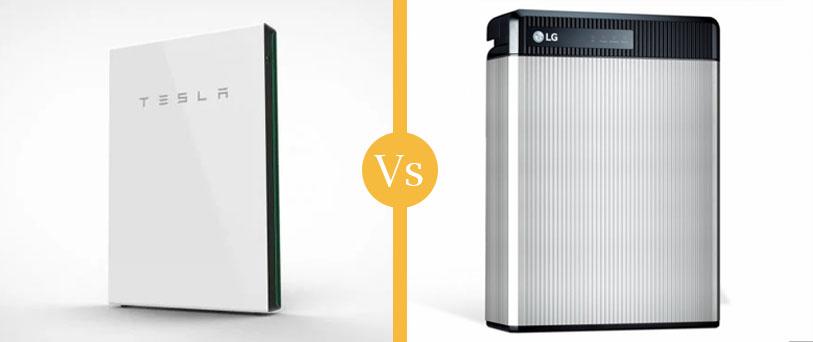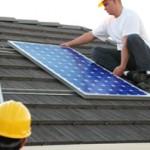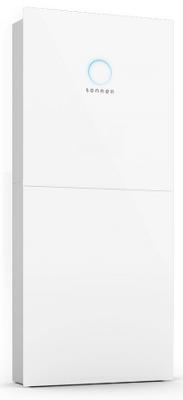Solar Battery Comparison: Tesla Powerwall vs LG Chem Resu

Storing the excess energy being generated by your solar panels will help to further reduce your energy bills and the best way to do this is with a solar battery.
We've put a couple of the best solar batteries head-to-head to help you install the right one for the amount of energy being generated by your solar PV system: Tesla Powerwall 2.0 vs LG Chem Resu.
Get Free Solar Panel Quotes: Get quotes and compare prices.
What is a solar battery?
During the day, solar panels are generating more energy than can be used around the home and this excess energy is sent to the National Grid. That is unless you have a solar battery.
Solar batteries store the excess solar energy being generated during the day for use when the solar panels aren't generating any power. Holding onto more of that solar energy has some real benefits:
- Use more of the energy being generated by your solar panels
- Power your home with renewable solar energy in the evening and at night
- Lower your energy bills even further
- Reduce reliance on your energy supplier
Tesla Powerwall 2.0
A capacity of 13.5 kWh means that the Tesla Powerwall has the biggest capacity of any solar battery currently on the market. Plus, if that isn't enough, up to 10 Powerwall solar batteries can be stacked together to store even more energy.
The Tesla Powerwall 2.0 has a sleek modern design that can fit seamlessly into any home for floor-standing or wall-mounted installation. However, if you'd prefer to keep it outside, it's completely weatherproof to make external installation possible.
LG Chem Resu
The LG Chem Resu Energy Storage System (ESS) are available in 5 different capacities, making it easier to find the right capacity to suit your solar PV system. Energy storage can be greatly increased with the addition of a Resu Plus Box, designed to combine 2 48V Resu models (2.9 kW, 4.2 kW and 8.8 kW batteries).
Get Free Solar Panel Quotes: Get quotes and compare prices.
Tesla Powerwall 2.0 vs LG Chem Resu
Let's begin this solar battery head-to-head by looking at the specifications of each unit side-by-side.
| Model | Tesla Powerwall 2.0 | LG Chem Resu |
| Capacity | 13.5 kWh | 2.9 – 9.8 kWh |
| Technology | Lithium-ion | Lithium-ion |
| Weight | 125kg | 31 – 99.8kg |
| Operating Temperature | -20°C to 50°C | -10°C to 45°C |
| Dimensions (HxWxD) | 1150 x 755 x 155mm | 452 x 403 x 120mm to 744 x 907 x 206mm |
| Mounting | Floor-standing or wall-mounted | Floor-standing or wall-mounted |
| Uninterruptible Power Supply | Yes | No |
| Warranty | 10 years | 10 years |
| Potential Cost | £5,400 | £2,200 – £5,100 |
Capacity
The LG Chem can't compete with the Tesla Powerwall 2.0 in terms of capacity, but neither can any other solar battery. Up to 10 Powerwalls can be stacked together to store even more solar energy. While the Powerwall 2.0 has the higher capacity, the average UK home is using around 10kWh each day so it might actually be too big for many homes.
There are 5 different LG Chem solar batteries available ranging from 2.9 kWh up to 9.8 kWh to give you flexibility. Up to 2 LG Chem solar batteries can also be stacked together with the addition of a RESU Plus Box.
Price
All LG Chem Resu solar batteries are available at a lower price than the Powerwall 2.0 making them a more budget friendly investment. With the Powerwall 2.0 having a larger capacity than the largest LG Chem solar battery – 13.5 kWh compared to 9.8 kWh – it's no surprise that it costs a bit more.
| Battery | Usable Capacity | Potential Cost (excluding VAT) |
| Tesla Powerwall 2.0 | 13.5 kW | £5,400 |
| LG Chem RESU 48V 3.3 | 2.8 kW | £2,200 |
| LG Chem RESU 48V 6.5 | 4.2 kW | £3,300 |
| LG Chem RESU 48V 10 | 8.8 kW | £4,400 |
| LG Chem RESU 7H | 6.6 kW | £4,400 |
| LG Chem RESU 10H | 9.3 kW | £5,100 |
Warranty
There's nothing to split the warranties of these solar batteries in terms of length with both offering lengthy 10 year coverage.
The Tesla Powerwall 2.0 will still achieve at least 80% energy capacity after it's been installed for 10 years, while the LG Chem Resu will achieve at least 60%.
In the unlikely event of a fault developing with the LG Chem during the first 2 years, LG will cover 100% of the purchase costs (when eligible) but only 72% once the unit has been installed for 3 years.
Uninterruptible Power Supply (UPS)
One of the major benefits of the Tesla Powerwall 2.0 is that it has an Uninterruptible Power Supply when fitted with a Backup Gateway 2. It's not often known that during a power cut many solar batteries will fail to work but the Powerwall 2.0 can.
The Storm Watch features means that the Powerwall 2.0 will scan the forecast in the area and charge up should a storm be on the way. So with the Tesla Powerwall 2.0 – with Backup Gateway 2.0 – you'll always have a power supply in the event of a power cut.
Tesla Powerwall 2.0 vs LG Chem Resu: Winner
For any home with a high power consumption, the Powerwall 2.0 is the winner thanks to the capacity of 13.5 kWh. Plus, the ability to stack up to 10 units means that if your energy consumption increases over time, you'll have a solar battery that can grow with you.
For the average UK home however, the LG Chem Resu is a reliable energy storage system with a range of capacities to suit match the needs of your home.
Interested in a solar battery?
After comparing two of the best solar batteries available in the UK, you might now be ready to have one installed and that's where we can help.
Take a couple of minutes to complete our simple online form and we'll match you with up to 4 solar battery installers based in your local area. All of our installers are MCS certified (or equivalent) and you'll get free quotes from each of them and best of all, there's no-obligation to accept any of the quotes you receive.
Get Free Solar Panel Quotes: Get quotes and compare prices.
Find local, MSC certified Solar Installers
Start your quote
Find local, MSC certified Solar Installers














